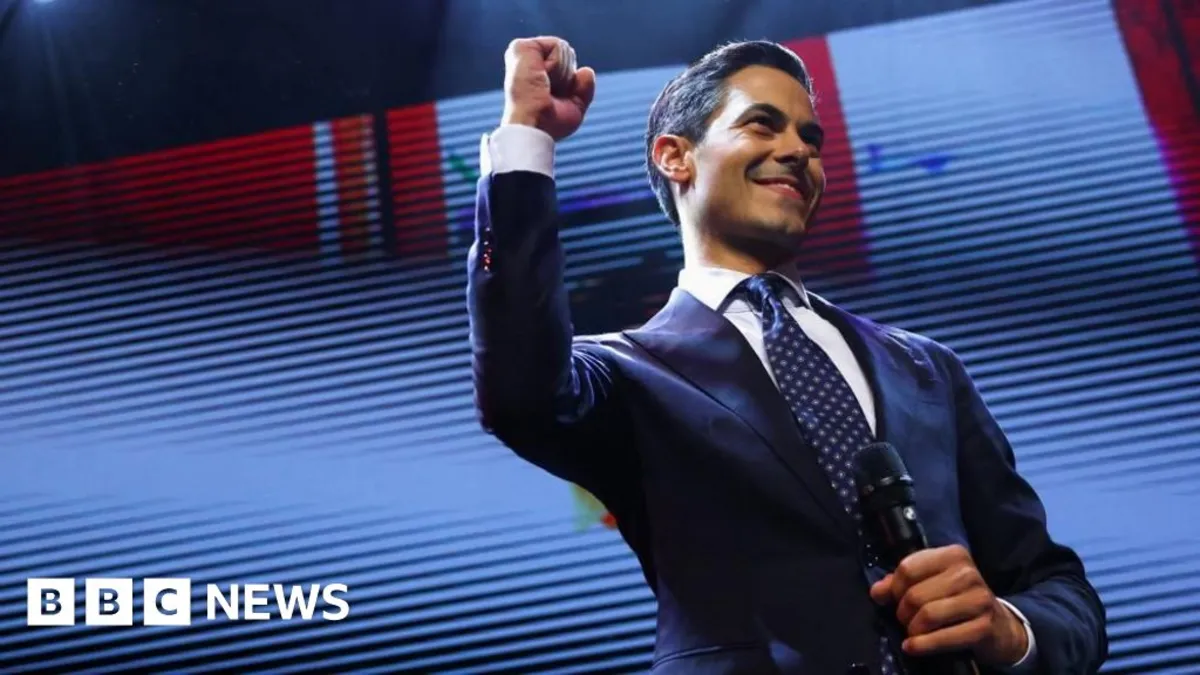
The centrist liberals led by Rob Jetten are on track for a surprising electoral triumph, as indicated by the latest exit polls. This comes just two years after Jetten's party was relegated to fifth place in the previous election cycle. The Ipsos I&O exit poll reveals that Jetten's D66 liberals are projected to secure 27 seats, surpassing the anti-Islam populist Geert Wilders, who previously won the last election.
Despite the final results remaining uncertain, Wilders has conceded defeat, while Jetten expressed optimism, stating that millions of Dutch citizens have “turned a page” and said goodbye to a politics of negativity. Close behind in the race are three other parties, including the conservative liberals, the left-wing GreenLeft-Labour coalition, and the Christian Democrats.
Throughout the election campaign, Wilders led in the polls but faced significant backlash after he dismantled his own coalition in June over disputes regarding asylum and migration policies. Mainstream leaders made it clear that they would not collaborate with him again, paving the way for Jetten's successful campaign.
Just weeks before the election, polls indicated that D66 would only achieve around 12 seats. However, Jetten, a charismatic 38-year-old, leveraged his strong performances in numerous television debates and interviews to boost his public image. His participation in the TV quiz show "The Smartest Person" also contributed to his rising profile among voters.
While Jetten refrained from declaring victory on election night due to the narrow margin of error in the exit polls, the conservative liberal VVD, led by Dilan Yesilgöz, also appeared to be enjoying a successful night in third place, positioning them well for a future coalition with Jetten.
As voters approached the polls, many anticipated a highly competitive election, with five parties vying for the top position. Wilders' PVV Freedom Party had previously secured 37 seats in November 2023, but this time voters were evidently deterred by the instability of Wilders' coalition-building capabilities. After taking seven months to finalize a coalition in 2024, he subsequently brought down the government just 11 months later.
Jetten emphasized his intention to forge a broad-based coalition that is both stable and ambitious, noting that it is unprecedented for a winning party to achieve fewer than 30 seats in parliament. He identified potential coalition partners, including the Labour (PvdA)-GreenLeft coalition, Yesilgöz's conservatives, and a revitalized Christian Democrat CDA.
The exit polls did not bode well for Timmermans, whose left-wing party, once a frontrunner, is now projected to finish fourth. Despite expressing disappointment, he assured supporters that better times were ahead, announcing his resignation and taking responsibility for the party's performance. Both Timmermans and Wilders, now in their early 60s and political contemporaries, reflect a changing sentiment among Dutch voters who seem ready for new leadership.
In response to his party's results, Wilders asserted that he intends to remain active in politics, declaring, “You won't be rid of me until I'm 80.” He remained optimistic about the Freedom Party's performance, claiming it was still their second-best election result.
The atmosphere was electric among D66 supporters who gathered in a music venue in Leiden to await the results. A subsequent exit poll, released shortly after voting concluded at 21:30 (20:30 GMT), reaffirmed the initial projections. Jetten addressed his supporters, proclaiming, “We did it - the best result D66 has ever achieved.” He acknowledged the responsibility he felt for all Dutch voters, emphasizing the need for a government that can inspire hope and ambition.
This election was significantly influenced by pressing issues such as migration, overcrowded asylum centers, and notably, the chronic housing shortage affecting nearly 400,000 homes in a nation of 18 million people. Jetten's party has committed to building 10 new cities as part of its strategy to confront this housing crisis.
Many D66 supporters expressed a desire for progress and unity, with one supporter, Eline, stating, “It shows the Dutch are craving a prime minister who is able to unite the country and tackle the major challenges our country and the world are facing.”
Among potential coalition partners for the liberals is the Christian Democrats, who appear to have made a significant comeback after a lackluster performance two years ago, now projected to secure 19 seats. CDA leader Henri Bontenbal expressed his excitement, stating, “What a fantastic result - two years ago we could not have dared to dream of this.”